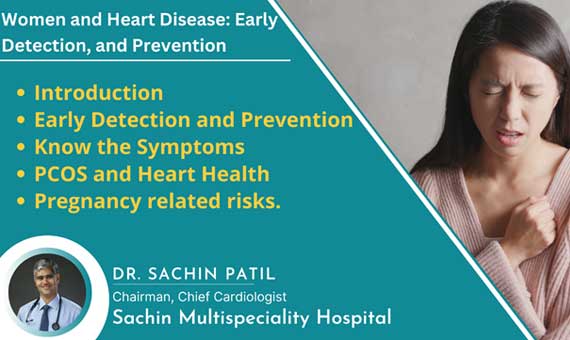
Blog
Women and Heart Disease
Women and Heart Disease : Understanding, Early Detection, and Prevention
Overview
When we think of heart disease, an image of an older man often comes to mind. However, heart disease is a major threat to women's health as well. In fact, heart disease is the leading cause of death among women worldwide. This comprehensive guide delves into the unique aspects of heart disease in women, the importance of early detection and prevention, the link between heart health and PCOS, and additional key considerations.

Understanding Heart Disease in Women
Heart disease refers to a range of conditions that affect the heart's function, including coronary artery disease, heart attacks, heart failure, and arrhythmias. It's crucial to recognize that women may experience heart disease differently than men. Women are more likely to have symptoms that are less obvious or atypical, leading to potential delays in diagnosis and treatment.
Early Detection and Prevention
Know the Symptoms :
- While chest pain is a common symptom for both genders, women may experience other signs such as shortness of breath, nausea, light-headedness, or pain in the jaw, neck, or back.
- Pay attention to your body and seek medical attention if you experience unusual symptoms.
Regular Checkups :
- Annual checkups with your healthcare provider can help monitor your heart health.
- Blood pressure, cholesterol levels, and other risk factors should be regularly assessed.
Heart-Healthy Lifestyle :
- Adopt a balanced diet rich in fruits, vegetables, whole grains, lean proteins, and healthy fats.
- Engage in regular physical activity and maintain a healthy weight.
- Avoid smoking and limit alcohol consumption.
Women and PCOS (Polycystic Ovary Syndrome)
Understanding PCOS :
- PCOS is a hormonal disorder affecting women of reproductive age.
- Women with PCOS are at an increased risk of insulin resistance, obesity, and type 2 diabetes, all of which contribute to heart disease risk.
Regular Physical Activity :
- Aim for at least 150 minutes of moderate-intensity aerobic activity or 75 minutes of vigorous-intensity activity per week.
- Exercise helps increase HDL cholesterol levels and improve overall cardiovascular health.
Managing PCOS and Heart Health :
- Regular exercise and a healthy diet can help manage PCOS symptoms and lower heart disease risk.
- Monitoring blood sugar levels and seeking treatment for insulin resistance is important.
Unique Considerations for Women
Pregnancy-Related Risks :
- Conditions like preeclampsia and gestational diabetes can increase heart disease risk later in life.
- Monitoring heart health during and after pregnancy is essential.
Menopause and Hormonal Changes :
- Estrogen provides some protection against heart disease before menopause.
- After menopause, women's risk for heart disease increases. Hormone replacement therapy should be carefully considered with a healthcare provider.
Stress and Mental Health :
- Chronic stress and mental health issues can impact heart health in women.
- Prioritizing stress management and seeking support for mental well-being is vital.


